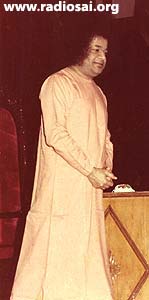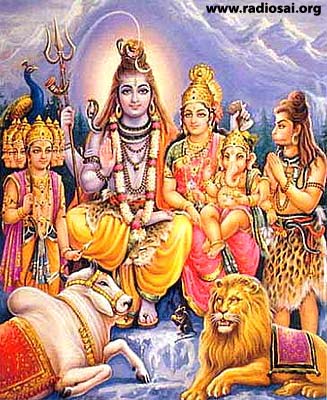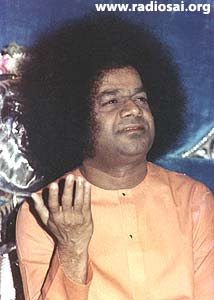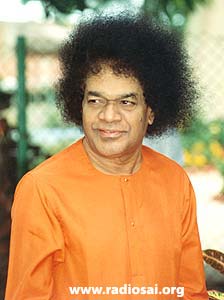 |
 |
 |
Volume
6 - Issue 05
MAY - 2008 |
CONVERSATIONS WITH SAI Satyopanishad - part 4:
CHAPTER 2 - TRENDS IN SOCIETY Anil Kumar (AK): Swami! Man is not behaving in the way expected of him. He is losing his very human nature. How should he transform himself at this juncture? What happens to society if he remains like this?
Bhagavan: You do not know that you are using certain words without knowing their meaning. If you understand the words that you utter, you will notice that they are self explanatory and convey their meaning in unambiguous terms. What is the meaning of this word manava, man? 'Ma' means maya or illusion; 'na', means daati (Telugu) or crossing over; 'va', means vartincu (Telugu) or to conduct oneself. In other words, 'manava' means 'the one who crosses maya and conducts himself accordingly', and definitely not one who is enslaved by maya. It can also be interpreted in another way. The word 'manava' means, 'ma', which means ‘not’, and 'nava', which means ‘new’. Thus 'manava ' means 'not new'. Man had many births earlier and the present one is ‘not new’. Man is also called narah (Sanskrit). ‘Na’ means 'not', and ‘rah’ means 'perishable'. Thus, narah, means 'not perishable'. Obviously, the one, which is imperishable, is eternal, that is, immortal, or atma, Truth. There is another word vanara (Sanskrit) denoting a 'monkey'. ‘Va’ denotes vala or tail. So ‘ nara ’ should be viewed as man without vala or tail. Man is saksara: ‘sa’, divine and aksara, undiminishable or permanent. Thus, saksara is one who is undiminishable, permanent or eternal, Atma. He, who has the awareness of such Atma, is saksara. But alas! Man today is behaving as raksasa, demon. Man is expected to have dama, control of senses, but he is full of mada, pride and conceit. So, when we understand the meaning of these words, we shall know that man or vyakti, the individual, should exhibit and express the quality of Atma, which he truly is. A community or a group of individuals makes a society. A single tree cannot make a forest. A single house cannot make a village. What is the meaning of samaja, or society? Sama, which means ‘equality or equanimity’, ‘ja’, is ‘born out of’. Thus samaja, is that which maintains equality and equanimity. What are needed for ideal society? They are samaikyata, unity; samagrata, coordination; samarasa, integration; saubhratrata, fraternity; and samanata, equality. These are the features of an ideal society.
We hear people saying that society should change. However, in my opinion, it is wrong. If the individual changes, society will automatically change. A small example: A father presented a map of India to his young son. The boy, by mistake, tore it to pieces and was reprimanded by his father. After some time, the son brought the map intact. When asked by the father how he could do it, the boy replied that on the reverse side of the map there was the picture of a man. He said the only thing he did was to correctly assemble the torn pieces of the man to make it into the original picture. Then the original map formed itself automatically. Thus, when individuals reform, society will automatically get reformed. Every person should know that the happiness of the individual depends on that of society. Man's welfare, progress and prosperity depend on society. This truth must be fully understood by everyone. For example, when there is a fire in the neighbourhood, you make an attempt to extinguish it. Why? If you do not, your house will not be safe. When all the other houses in the neighbourhood are burnt down by the fire, your house too will be burnt. When there are epidemics like cholera, you will be extra careful; otherwise, you will also become one of the victims. Similar is the relationship between an individual and the society he lives in. AK: Swami! Maybe due to the impact of the Age of Kali, we don't find in these days, any understanding among the members of a family. Instead, we find differences in many families, even conflicts, complexes, competitions; and sometimes matters become so bad as to drag a family to the courts. Please suggest a way out of this sad plight, Swami! Bhagavan: In this world though diversity is apparent, there is an inherent unity. Multiplicity may be patent; but the underlying unity is latent. The whole of nature shows both these aspects. Take the earth; it is not the same throughout. There are hills, mountains, and valleys. However, in our experience we clearly visualise unity. Are the five fingers of the same hand identical? No. Similarly, the members of one and the same family are not alike or uniform. They are not stereotypes. All the same, there cannot be any valid reason for the absence of fraternity, unity, and love among the members of the family.
A good example from our epics maybe cited in this context. You analyse 'the family our Lord Siva'. Siva has Ganga water over his head, and fire on his forehead between the two eyes. He is, therefore, Trinetra or 'the three-eyed' God'. 'Water' and 'Fire' are also opposed to each other in their nature and don't coexist. Siva is pannagadhara, nagabhusana for He has venomous serpents around His neck. The vehicle of his elder son, Lord Subrahmanya, is a peacock. Snakes and peacocks are enemies. The vehicle of Goddess Parvati, consort of Siva, is a lion; she is simhavahini. The very face of Siva's second son is that of an elephant. Ganesh is called Gajanana for this reason. An elephant can't even dream of the sight of a lion. Parvati has all the jewels, but Her Lord, Siva is digambara, with minimum attire, and bhasma bhusitanga that is, vibhuti smeared all over His body. Though Siva's family is full of opposites and contradictions, there is integration, coordination, harmony and unity. Similarly, in your families, the members may differ from each other, yet you should be able to live in perfect harmony like Siva's family. This is the lesson that over the ages Lord Siva has been teaching the world. AK: Swami! Today the whole world is strife torn. We hear of racial discrimination, class conflict, bloodshed, war, and so on. Kindly give some message to the present day world. Bhagavan: Today we have many intellectuals who find diversity in unity. There are only a few who notice unity in diversity. This is the reason for the present day troubles, turmoil, conflicts, wars, and so on in the world. Manava, man is behaving like a danava, demon. So we find violent, demonic, bestial, and inhuman tendencies among people. The moment man recognises and experiences unity in diversity, peace, comfort, safety, security, and happiness are ensured. The composition of human blood is the same all over the world; everybody breathes oxygen. All tread the same ground. Hunger is one, be that of a rich man who may dine in a five star hotel or of a beggar who appeases his hunger with mere starch. Thirst is one and the same, be that of a rich man who will have a cool drink or of a poor man who drinks tap water in the street. Both feel happy in moments of joy and both grieve in times of difficulties.
The human body is composed of the five elements: earth, water, air, fire, and space. The body is inert. We breathe air into it. There is also fire within, keeping the body warm and helping us in digesting food. There is space within accommodating all parts of the human body. There is plenty of water in the body. So the five elements outside are also inside you. Everyone has them in the same proportion. All that you have is also present in everybody else. Then, why do you stretch your hand begging from everyone? What for? What is it that you don't have which the other man has? Basically nothing! This is the philosophy of unity in diversity. This unity is divinity. The experience of this sort of spiritual unity is liberation, whereas the feeling of multiplicity, plurality and diversity is bondage, dualism, and attachment. Flowers are many, but worship is one; Cows are many, but milk is one. Jewels are many, but gold is one; paths are many, but the goal is one; stars are many, but the sky is one; beings are many, but breath is one; names and forms are many, but God is one. This is oneness or unity. Yarn is multiple, but when interwoven, it becomes a piece of cloth. This is how you should find out and experience unity in order to realise divinity. People fight in the name of religion. What a shame it is! No religion tells you to speak lies, to harm or kill others or do any such things. All religions lay emphasis on love, brotherhood, sacrifice, peace, truth, and so on. So, it is ridiculous to fight in the name of religion. In fact, matulu mancivainamatamedi ceddadi, (Telugu) ‘if your mind is good, which religion is bad’? There is only one religion, the religion of love. To have differences based on language or race is bad. It is a sign of narrow mindedness. There is only one language, the language of the heart. It is very mean to have differences on grounds of caste. You are not born with a signboard indicating your caste. What is the caste of the air? To which caste does water belong? What is the caste of fire and earth? Therefore, there is only one caste, the caste of humanity. Wars are fought in the name of God. Don’t you know that there aren’t many Gods? God is one without a second. You may call Him by any name. There is one God who is Omnipresent. Ekam sat viprah bahudha vadanti, ‘Truth is one, but interpreted in many ways by scholars’. There are no differences in divinity. With cittasuddhi, purity of heart, you can experience the principle of unity or oneness, which is the path to divinity. First, develop purity. That helps you to achieve unity and attain Divinity. AK: Swami! In reality, the entire human race is one and the same, its basic core being divinity. Why then do we not react in the same way? Why do we think and act differently? Bhagavan: Humanity may be one, but people act in different ways. No two are alike. This is the law of nature. Thought, words and actions depend on time and circumstances. Here is an example. A tender fruit is sour in its taste; an unripe fruit is astringent, while a ripe fruit is sweet. All the three are the stages of the same fruit, aren't they! It is sour, then astringent and finally sweet. How does it happen? Why? The change of taste is due to the passage of time. No one has filled the ripe fruit with sugar. So, I say yetti matiyo, atti gati; yetti sthitio, atti sampatti (Telugu verse). ‘As is the mind, so is the destiny; as is the position, so is the affluence.’
In human life, there are three important aspects, 'doing', body; 'thinking', mind; 'being', Atma. Body desires, mind thinks and atma experiences. You should have broadmindedness. You should never be narrow-minded. When examination results are published, why don't you feel happy that so many have passed the examinations? If in the spirit of a large heart, you look for your result, you will definitely find your number in the newspaper along with those of other candidates. It is but narrow-mindedness if you look only for your own number unmindful of others. Another example: Suppose you feel happy that in a group photo everyone has figured nicely. If you then look at your own figure, you will be known to be broadminded. Human life is a combination of three attributes, trigunas. The three work in perfect union as the three wings of a fan. Just as a chutney is made of tamarind, salt and chillies well ground, so also human life has trigunas, well mixed. You also must have known pan, which Indians chew. It has three ingredients, betel leaf, betel nut and lime, of green, brown and white colours respectively. When the ingredients of three different colours are chewed, you get the red colour. Similarly, in human life all the three gunas are intermixed. But spiritually, basically and fundamentally, the core of the human being is sat, 'being', cit, 'awareness' and ananda, 'bliss'. Sat and cit together confer ananda. An example: Here are two separate things, water and sugar. When you mix the two it is neither sugar nor water, but syrup. So also water is sat, sugar is cit, forming the syrup ananda. The triune trigunas (three attributes) and the basic nature of sat, cit, and ananda mixed with deha, body, manas mind, and buddhi intellect, interacting with pravrtti, the external world, lead to anekatva, that is diversity or multiplicity or plurality. AK: Swami! We hear the words, rajaniti and rajakiyam. Are these, in fact, one and the same? How should we name what we see around us? Bhagavan: Rajaniti and rajakiyam can never be the same. Look at Rajayoga. Among the yogas, the one most highly revered which stands king-like is given that name. Similarly, the very greatest among moral codes, equal in status to a king among men, is called rajaniti. The king of animals is the lion, you know. Rajaniti is conjoined with Satya, bound by Dharma, and confers all welfare. What you have today are not rajaniti or rajakiyam political strategies, at all, but rajakayyams - battles royal, born of malice, envy, and hatred. All these are kayyams, bitter fights. Therefore, they are rajaki yams. AK: Swami! We have people of varied temperaments, views, ideas, outlooks, ambitions and interests. Conflict becomes inevitable. Each one wants things to happen in their own way. What should we do then? Bhagavan: Munde munde matirbhinna, heads vary. No two people look alike: no two think in the same way. It is quite natural that ideas differ. Each one feels that he is correct. But you should maintain the spirit of unity, equality and equanimity. A small example: Once upon a time all the five fingers of the palm started claiming superiority over one another. First, the little finger said to the others, "Look! As you do namaskar, I come first. Therefore, I am important". The ring finger then said, "What! Don't you know my value? Costly diamond and gold rings are worn round me!" Then, the middle finger said, "Very funny! What are you talking about? I am ready to wear costly rings. Why not? Some do that way also. Further, don't you see me, who am taller than all of you? Isn't that enough to say that I am superior to all of you?" The forefinger started saying, "If you want to direct anybody, I come first. People show me to direct people. Further, even to warn or caution others, I come first. Don't you see this?" Then, last but not the least, the thumb smiling said, "I have been watching so long all that is happening! Unless I join, even if the four of you stand united, you cannot function. While eating anything, can you manage without me? Why go to that extent? When you shoot an arrow, I have to pull the string backwards with force. Else, the arrow will never go far. So mine is the highest position among us".
This is how we find people staking their claims for superiority over one other. You should always be ready to receive the good from anybody. You should work in cooperation and harmony with one another. No one should feel superior to anyone. Otherwise, because of the domination of one over another, groups, factions, rivalries, controversies and conflicts arise. As a result, the spirit of love totally vanishes from the scene. Unless all the five fingers join, you cannot do anything, you see! Society can never progress if there is no cooperation, integration and unity among its members. (To be continued...) – Heart2Heart Team
|
Vol 6 Issue 05 - MAY 2008
|
Best viewed in Internet Explorer - 1024 x 768 resolution. |






